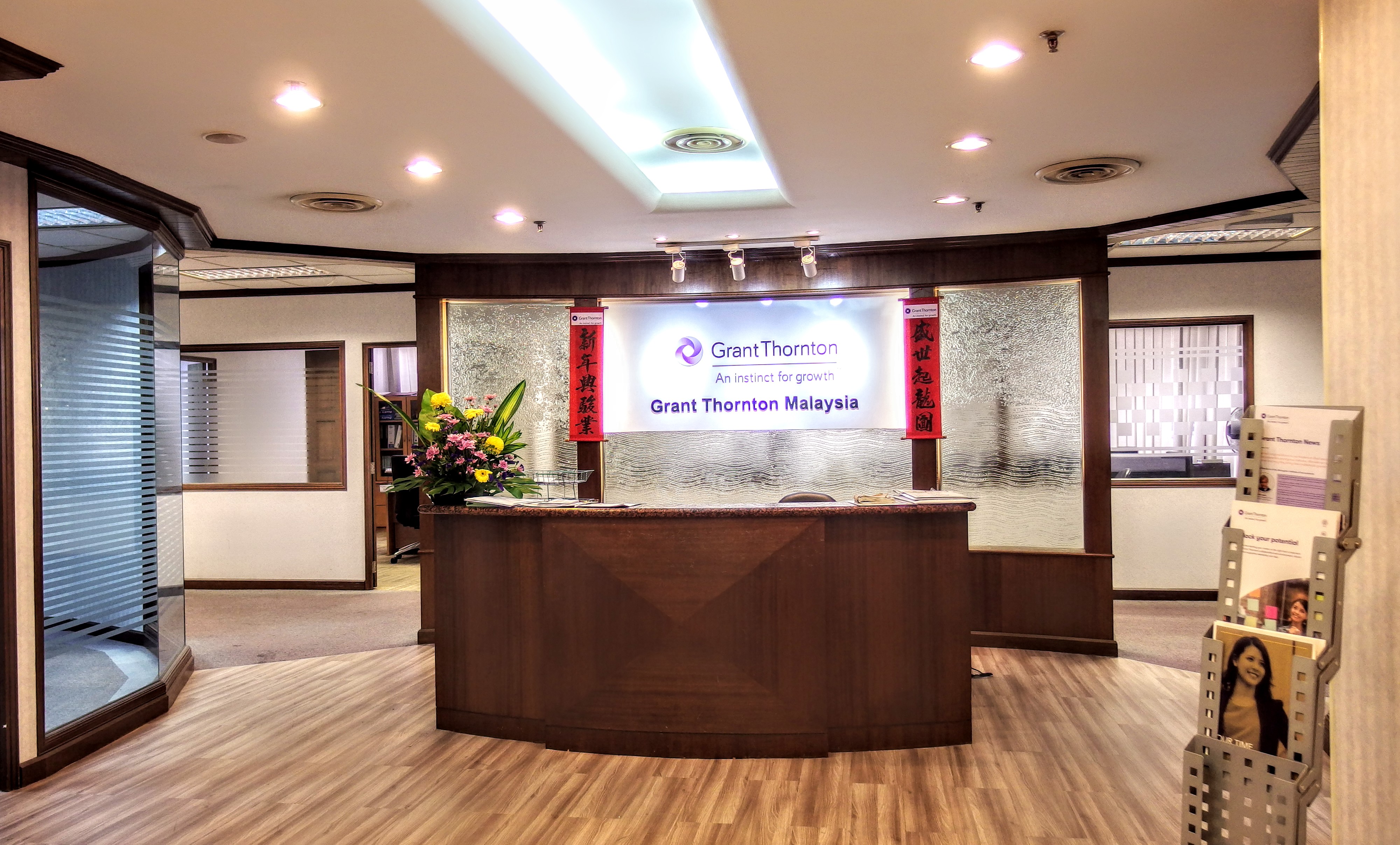Grant Thornton Malaysia with Japanese CPA

2019/04/30
Supports Japanese companies speedily and finely, taking advantage of the mid size
The problem for companies expanding to overseas is how to understand and comply with the company laws, tax laws and accounting standards (→ taxation and accounting legal systems and regulations) in which they operate.
In this respect, it is an effective means to consult with an international big firm, but some companies may find that the international big firm has a high threshold.
Therefore, the option is to use a medium-sized accounting firm that is not a big 4 but is developing multi-nationality and and can consult with Japanese CPAs. In Malaysia, that's exactly what Grant Thornton Malaysia does.
We spoke to a Japanese accountant, Mr. Takahiro Tsuji, who work in the same office.
.jpg)
Grant Thornton Malaysia
Japan Desk Director
Mr. Takahiro Tsuji
Certified Public Accountant (Japan). In 2018, he moved to Grant Thornton Malaysia from Japan's Solar Grant Thornton. Besides Malaysia, he also serves Japanese customer in Singapore and Cambodia.
◆Grant Thornton Malaysia◆
Established in 1974. A member firm of the Grant Thornton Group. There are bases in Kuala Lumpur, Johor Bahru, Penang and Kuantan. The number of staff is about 800. The main business is accounting audit, taxation, advisory (establishment, liquidation, merger (→ M & A), due diligence etc.)
Environment where decision making is speedy and can catch up with the latest information quickly
ーWhat is Grant Thornton position in a Malaysian accounting firm?
Mr. Tsuji The Grant Thornton Group, headquartered in London, is an international accounting firm with office in more than 130 countries, number of bases is 700 with more than 50,000 staffs. It is more easy to understand the size that will come next to a major accounting firm called “Big 4”.
Grant Thornton Malaysia, a member firm of the Grant Thornton Group, is also recognized as a “mid-size firm” in Malaysia.
ーWhat are the characteristics and strengths of Grant Thornton Malaysia?
Mr. Tsuji: Midsize Grant Thornton is smaller than the major ones, and can provide detailed services. In addition, the quality control department regularly collects and delivers information on the latest information.
It is the strength of Grant Thornton at mid-size firms that can cover the disadvantages of large and small firms.
ーMr. Tsuji is in charge of the Japan desk in Malaysia, but are there many cross-border projects?
Mr. Tsuji: Not only Japan-Malaysia, there are also many cross-border projects such as Singapore-Malaysia, Malaysia and other ASEAN.
Grant Thornton currently has a Japan desk in the ASEAN region but beside Mynmar & Laos. In addition, at Grant Thornton, Japanese accountants who are resident in each ASEAN country exchange with training once a half year, so there have a deep horizontal connection, and one of the strengths is that they can handle cross-border projects in a one-stop way.
ーYou are holding a Certified Public Accountant in Japan, but are you also familiar with tax laws and accounting standards in ASEAN countries?
Mr. Tsuji: We have many professionals specified in Malaysian taxation and accounting.
Most of the consultation cases are about tax, but accounting audits, bookkeeping agents, company establishment, liquidation etc. can also be consulted.

Consultation cases that are increasing "Transfer price”
ーAre consultation projects from Japanese companies increasing?Mr. Tsuji:Yes, increasing. The reason is fraudulent accounting of company in Japan became a problem, took a direction to accounting of overseas subsidiaries is all right?
For oversea subsidiaries, there are relatively lesser problems where Japanese staff are stationed, but we received a lot of consultation of if the head of the local subsidiary is local staff, the head office does not have knowledge of accounting and internal control, but would like to do an investigations and leverages, what should we do?
ーHow do you deal with the case like that?
Mr. Tsuji:At first is investigation. We will investigate the content of accounting, rules for hiring staff, calculation methods of personnel expenses, and internal control. If there is a problem, create a rule and then check if the rule is followed.
ーIt seems quite difficult
Mr. Tsuji: Yes, it is. I think because it is difficult, so that you need to ask us.
There are cases where such a project may be requested first by a subsidiary in ASEAN and then by another subsidiary, but since I can also explain to Japanese representatives of member firms in other countries, it can save time and we have been delighted by our clients.
ーAre there any other projects that are increasing?
Mr. Tsuji : There are increasing cases that related to “Transfer Pricing Taxation (※1)”. With regard to transfer prices, Malaysia has been ruled from 2009, but there are no penalties, and the number of companies preparing related documents has increased as a result of entering the check list of corporate tax returns in 2014.
In Japan as well, it seems the demand came out at once due to the three-tiered transfer pricing documentation system (country report, master file, local file) from the fiscal year starting on April 1, 2016.
※1 Transfer Pricing Taxation - Due to international transactions among group companies, multinational corporations are increasing their tax avoidance by using international double taxation exemption from differences in taxation systems in two or more countries. In order to prevent this, the OECD (Organization for Economic Co-operation and Development) has been promoting international efforts on “Base Erosion and Profit Shifting (BEPS)”, and the transfer price tax system is one of them.
For example, when trading between a Japanese headquarters and a Malaysian subsidiary, if the price differs significantly from the average price of buying and selling similar products in the same market, it will be taxed under the transfer price taxation system. In order to avoid the taxation, documents are required to prove to the national tax authorities that the relevant price is appropriate.
In Malaysia, basically all companies involved in related party transactions are required to documentation transfer prices. However, simple documentation is considered to be sufficient except in the following cases.
■ Total revenue of more than RM25million and related party transactions total more than RM15million, or
■ If the amount of funding between related parties is more than RM50million, it is necessary to submit a transfer price document within 30 days if requested by IRBM (Inland Revenue Board of Malaysia). If it is not prepared, a penalty of 35% of transfer price surcharge and a penalty of 25% is imposed if it is determined that the contents is not in accordance with the transfer price guidelines of although it is prepared.
.jpg)
The number of Japanese companies entering the market is increasing in 2019
ーIn 2018, there were various things change in Malaysia such as the general election, a change of government, the abolition of GST and revival of SST, were there any effects?
Mr. Tsuji : The contents of SST have not yet been fully firmed, and I sometimes receive consultations, but there was not big confusion.
Rather than that, due to change of government, the Japanese companies (※2) had less inroad in 2018, but i felt that inquiries about expansion have increased, probably because the political situation has settled down in 2019.
※2 Japanese companies registered in JACTIM (The Japanese Chamber of Trade & Industry Malaysia)
As Malaysia has a system of MSC (※3), where IT companies have been making inroads into the market for the past, but recently there are new business projects like bio.
※3 Multimedia Super Corridor is a plan to attract IT Companies.
Companies with this status can receive preferential treatment in terms of tax payment and employment of foreign workers.
ー Are Malaysia and Japan tax and accounting systems very different?
Mr. Tsuji: It's quite different. For example, in Japan, accounting audits are basically required only for listed companies and companies under the Companies Act, but in Malaysia, all companies of any size need to conduct accounting audits. Therefore, there are many of accounting firms.
Furthermore, in Japan it is necessary to open a general meeting of shareholders within 3 months from the closing date to approve or report the financial results, but in Malaysia it’s to send the audited financial statements to the shareholders within 6 months. Because there is a time lag in Japan and Malaysia, therefore, as a Malaysian subsidiary can not agree with the timing of submission materials to the parent company without their awareness, unless the headquarters side's schedule is firmly communicated. if not, will felt like “Why do you rush so fast?”
ーIt seems that there are many difficult things, but what is the best part of the accountant's work?
Mr. Tsuji: Audits are the main activities of the accountant, after reviewing the company's internal information in detail, it may be required to make corrections to the accounting process and evaluation adopted by the other party. On the other hand, one of the best things about an accountant's job is probably you can use accounting and tax knowledge to solve client issues. Before I became a Certified Public Accountant, I worked as sales for a general company, but I feel more rewarding now because I could help client to solve their problems.
Click here for details on Grant Thornton Malaysia


